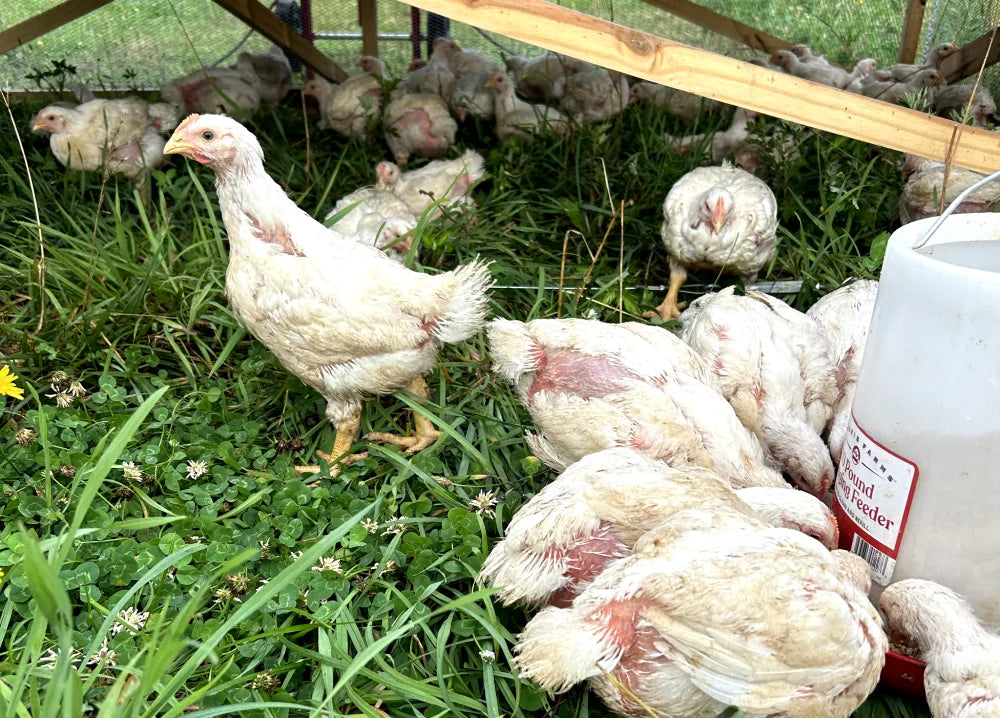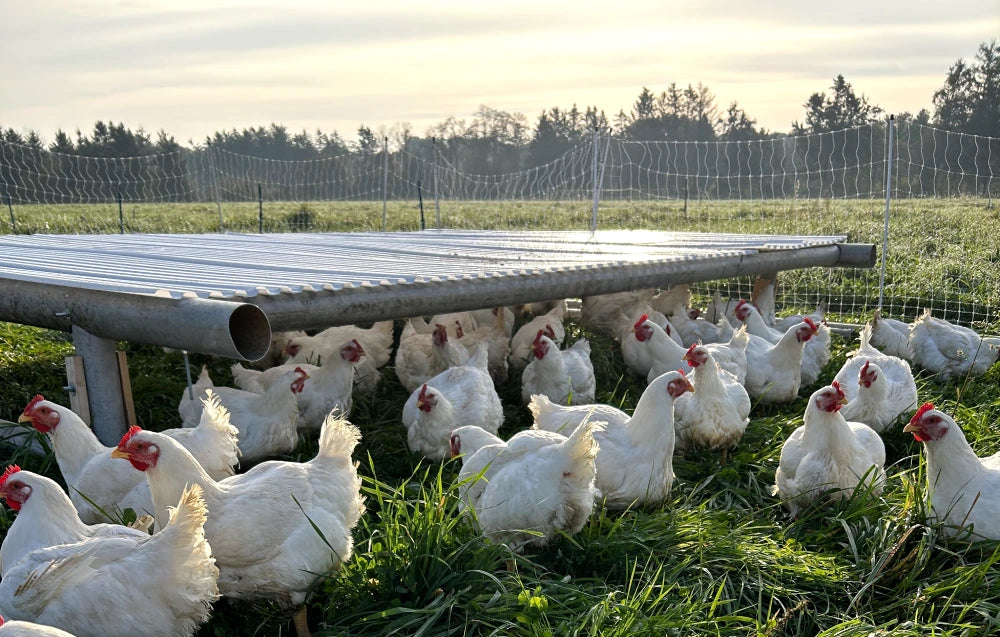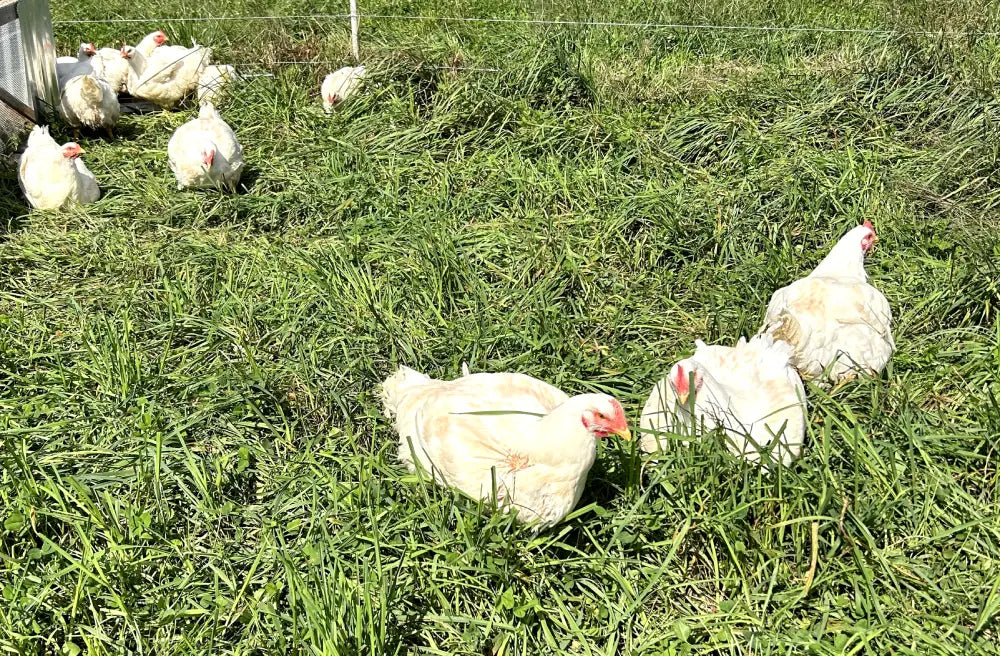There you are in the grocery store, standing before the choices of chicken, wondering what’s the best one for your household. Unless you spend your free time reading about chicken farming and food manufacturing, the packaging on chicken gets confusing very quickly. What is pasture-raised chicken, exactly? And what about free-range, organic and cage-free chicken? Some clear information would be helpful. We’re here to provide it.
The question we address in the following is simply this: Are all chickens raised the same, and does it really matter? You’ll soon see that no, they are not, and yes, it does. That’s especially true when considering the benefits of pasture-raised chicken.

Key Takeaways
- There really is a difference between free-range vs. cage-free vs. organic vs. pasture-raised chicken.
- Large, conventional poultry farms can have a significant, negative impact on the environment.
- Pasture-raised chicken provides many benefits, including a higher level of nutrients and less exposure to antibiotics.
- Pasture-raised chicken are raised on sustainable farms.
- In addition to being more humane for the animal, pasture-raised farms are also better stewards of the environment.
Health and Environmental Impact of Conventional Chicken
Once you know how conventional chicken is raised, it’s impossible to simply walk into the grocery store and buy the cheapest, biggest package of chicken breasts you can find. It’s not the best decision for your own health or for the environment.
The list of issues with conventionally raised chicken is a long one. It includes the following.
Use of Antibiotics
In conventional chicken farming, antibiotics are often used to prevent disease in crowded conditions. Overuse of antibiotics can contribute to development of antibiotic-resistant bacteria, posing a significant threat to human health.
Exposure to Chemicals
Conventionally raised chickens may be exposed to pesticides, herbicides and other chemicals used in feed production or to control pests and diseases on farms.
Environmental Issues
Intensive chicken farming produces large amounts of waste, including feces, urine and excess feed. Improper management of this waste can lead to water pollution through runoff, leaching into groundwater or direct discharge into water bodies.
Large-scale poultry farming often requires large areas of land, which can lead to habitat destruction, loss of biodiversity and disruption of ecosystems.
Nutritional Content
Conventional chicken raised in intensive farming systems may have lower nutritional content compared to pasture-raised chickens. Factors such as diet, living conditions, and stress levels can affect the nutritional quality of the meat.
What does "Pasture-Raised" Really Mean?
Pasture-raised chicken refers to poultry that is raised outdoors on pasture or grassland, with access to fresh air, sunlight and natural vegetation. This term often leads to the question, "Is grass-fed chicken a thing?" While chickens can eat grass, they are omnivores and naturally forage for insects, plants, and seeds. Unlike conventionally raised chickens, pasture-raised chickens are allowed to engage in their natural behaviors. They typically are raised on smaller farms that adhere to sustainable farming practices.
The following looks at a comparison between pasture-raised chicken and chicken packaged with other labels. For the most part, those other labels are on packages of what is still essentially “conventional chicken” that can be raised in crowded conditions, given hormones and antibiotics and rarely (often never) given access to the outdoors. The only chicken that is significantly different - and healthier - is pasture-raised.

Pasture-Raised Chicken vs. Free-Range Chicken
Like pasture-raised chicken, cage-free chicken spend the majority of their time outdoors, engaging in natural behaviors. Free-range chickens also have access to outdoor areas, but the size and quality of the outdoor space varies. The definition is fairly loose. It could be a small, enclosed space with minimal usable area.
Foraging is a fundamental aspect of pasture-raised chicken farming. However, while free-range chickens may have access to outdoor foraging areas, the availability of natural food sources and extent of foraging varies depending on the size of the space and the farm’s management practices. And those practices can veer into the horrific. A recent undercover investigation revealed that chicken advertised as free-range actually lived in crowded conditions with lesions, injuries and deformities, according to Vox.
Pasture-Raised Chicken vs. Organic Chicken
With organic chicken, the focus is on their diet, with chickens fed certified organic feed grown without synthetic pesticides, herbicides or GMOs. However, the chickens themselves may or may not have access to the outdoors. The term “organic” alone does not guarantee outdoor access or humane living conditions. Many large chicken operations may bill themselves as producing an “organic” product but still house chickens in overcrowded conditions.
Pasture-Raised Chicken vs. Cage-Free Chicken
Cage-free poultry operations get rid of the cages many conventional chicken farms use, but they often live in large, overcrowded and often dirty indoor buildings with limited freedom of movement and no guaranteed access to the outdoors. They also can be given feed that has been exposed to pesticides, herbicides and other chemicals used in feed production.
Pasture-Raised Chicken vs. Conventional Chicken
Conventionally raised chickens spend most, if not all, their lives indoors in large, confined buildings. They have minimal space and limited opportunity to express natural behaviors. As can be seen above, conventional-raised chicken can include chicken advertised as organic, cage-free and free-range. Only pasture-raised chicken is truly different.
Pasture-raised poultry farms also support sustainable agriculture. Conventional poultry operations have been associated with pollution of waterways, habitat destruction, loss of biodiversity and disruption of ecosystems.
The dietary variety of pasture-raised chicken contributes to the taste and nutritional profile of the meat. Conventionally raised chickens primarily rely on commercially produced feed that may contain antibiotics. Pasture-raised chicken have a more flavorful and nutritious profile due to diet and exercise.
Pasture-Raised Chicken vs. Store-Bought Chicken
In addition to the differences in animal welfare and environmental impact, there also are many differences between the quality and taste of pasture-raised chicken vs. the typical chicken choices you find in the grocery store.
Pasture-raised chicken tends to have high nutritional quality compared to conventionally raised chickens. This translates to meat potentially containing higher levels of omega-3 fatty acids (beneficial for heart health and reducing inflammation), more vitamin E (an antioxidant important for cell health) and potentially increased levels of conjugated linoleic acid (CLA), a fatty acid that may benefit weight management and immune function. Pasture-raised chicken will also have a healthier fat profile than conventional chicken, as does pasture-raised beef.
Pasture-raised chicken also offers a richer and more robust flavor compared to conventionally raised chicken, as well as a more tender and succulent texture. Typical grocery store chicken has a milder flavor profile, and variations in processing methods, breed and farming practices can result in differences in texture and taste. Pasture-raised chicken also has less overall fat and saturated fat compared to conventionally raised chicken.

Is Pasture Raised Chicken Really Better?
Is pasture-raised chicken really better than organic, free-range and cage-free chicken? The following provides an overview of the health, environmental impact and ethical agriculture involved with pasture-raised chicken.
Health Benefits of Pasture-Raised Chicken
Pasture-raised chicken offers several potential health benefits compared to conventionally raised chicken, stemming from the differences in their living conditions and diet.
Pasture-raised chickens eat a natural diet when compared to conventional feed. The diverse diet of pasture-raised chickens results in meat that is richer in essential nutrients such as omega-3 fatty acids, vitamins and minerals.
Pasture-raised chicken also has reduced exposure to antibiotics. Conventional chicken farms may use antibiotics to prevent disease in crowded conditions. Overuse of these antibiotics can contribute to development of antibiotic-resistant bacteria.
Environmental Impact of Pasture-Raised Chicken
Pasture-raising practices help maintain healthy grasslands and prevent soil erosion. This is in contrast to large-scale deforestation often associated with growing crops for conventional chicken feed. Pasture-raised chickens act like natural tillers and fertilizers. As they forage, they aerate the soil, promote drainage and fertilize it with their manure. This can help improve soil health and fertility over time.
The presence of chickens grazing on pastures can encourage a wider variety of plant and insect life. This contributes to a more balanced and biodiverse ecosystem compared to conventionally raised chickens, typically housed in barren environments.
Sustainable farming practices used for pasture-raised chickens also have a lower carbon footprint, reducing carbon emissions because of less reliance on feed production and transportation.
Ethical Considerations of Pasture-Raised Chicken
Pasture-raised chicken farming offers several ethical benefits compared to conventional intensive farming methods.
Animal Welfare
Pasture-raised chickens typically have better living conditions and higher welfare standards compared to chickens raised in crowded and confined environments. They have access to outdoor space where they can exhibit natural behaviors and engage in activities such as foraging and socializing.
Reduced Stress and Aggression
Pasture-raised chickens experience lower levels of stress and aggression compared to chickens raised in overcrowded and stressful environments. Access to outdoor space and opportunities for natural behavior help reduce stress levels, leading to healthier and more contented chickens.
Improved Health
Pasture-raised chickens are less susceptible to diseases and health issues commonly associated with intensive farming practices, such as overcrowding, poor ventilation, and high levels of ammonia in confined spaces. Outdoor access and exposure to sunlight contribute to stronger immune systems and overall better health for pasture-raised chickens.
Enhanced Environmental Stewardship
Pasture-raised chicken farming is more sustainable compared to intensive farming methods. Integrating chickens into diversified farming systems promotes soil health, reduces reliance on synthetic inputs such as fertilizers and pesticides, and contributes to biodiversity conservation. Pasture-raised systems also help mitigate environmental pollution by minimizing waste runoff and greenhouse gas emissions associated with industrial farming.
Support for Sustainable Agriculture
Choosing pasture-raised chicken products supports sustainable agricultural practices that prioritize environmental stewardship, animal welfare, and community well-being. By purchasing pasture-raised chicken, consumers contribute to the growth of a more ethical and environmentally friendly food system.
Where to Buy Pasture-Raised Chicken
The best place to buy pasture-raised chicken is from a trusted source that practices sustainable farming. Acabonac Farms has been that trusted source for many years, providing the opportunity to purchase high-quality, pasture-raised beef and pasture-raised chicken online from anywhere in the country.
Acabonac Farms' is founded on a commitment to sustainable farming practices and ethical treatment of animals. Our meat is antibiotic-free, non-GMO, humanely raised and regeneratively raised. At Acabonac Farms, pasture-raised chickens also receive a non-GMO grain-based feed to supplement their diets. Located in Long Island, N.Y., Acabonac Farms provides pastured-raised chicken and beef products to people around the country through convenient online shipping and delivery options for fresh meat.
Tips For Cooking Pasture-Raised Chicken
Cooking pasture-raised chicken requires attention to detail to highlight its flavor and maintain its tenderness. Here are some tips for cooking pasture-raised chicken.
Focus on Simplicity
The natural flavor of pasture-raised chicken shines through without a lot of fuss. Simple seasonings like salt, pepper, herbs and spices are often all you need.
Choose the Right cut
Different cuts suit different cooking methods. Roasting is Ideal for whole chickens, bone-in breasts and thighs. Pan-searing is great for boneless breasts and thighs. Grilling is perfect for bone-in thighs, breasts and wings, while stewing is good for breasts or for shredding cooked chicken for dishes like soups or casseroles.
Lower Cooking Temperature
Since pasture-raised chicken is leaner, high heat can dry it out. Consider using a slightly lower oven temperature for roasting or reducing heat when pan-searing or grilling. Keep in mind that it's important to cook chicken to a safe internal temperature (165°F), but avoid going beyond that point. Use a meat thermometer to ensure accurate cooking and prevent dryness.
Resting is Key
Let your cooked chicken rest for 10-15 minutes after taking it off heat. This allows the juices to redistribute throughout the meat, resulting in a more moist and flavorful bird.
Buy Pasture-Raised Chicken Online from Acabonac Farms
If you’re looking for a healthier, ethical choice for your chicken, Acabonac Farms provides the most nutritious and delicious pastured-raised chicken in the country. You’ll get all the health benefits of our chicken, as well as know you are buying meat from a business committed to ethical farming practices and environmental stewardship.
You can order directly from our website, with the option to get regularly scheduled deliveries of high-quality chicken right to your front door. Choose from our wide variety of products, including pastured chicken breasts, pastured chicken wings and pastured drum sticks to whole chickens and versatile ground chicken.

